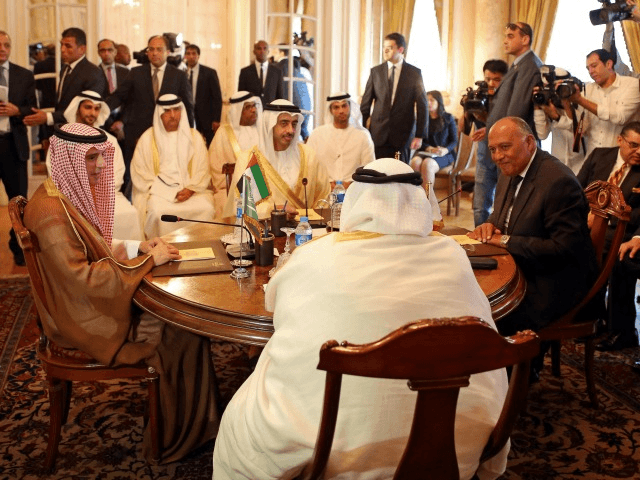The extended deadline for Qatar to meet a list of 13 demands imposed by Saudi Arabia, Egypt, the United Arab Emirates, and other neighboring states passed on Tuesday, without any sign of compliance from the embattled emirate.
Saudi Foreign Minister Adel al-Jubeir accordingly announced on Wednesday that the boycott will remain in place.
Theodore Kattouf, the former U.S. ambassador to Syria and the UAE, told CNBC that he wasn’t surprised Qatar slid past that compliance deadline. He said that asking Emir Tamim bin Hamad al-Thani to “close a base where Turkish troops are stationed, downgrade relations with Iran, and close Al-Jazeera—the flagship satellite channel in the Middle East—would be humiliating.”
“So there’s no way out of this immediately,” Kattouf concluded.
He said the tremendous oil wealth of both Qatar and most of its adversaries would allow them to continue the showdown for some time to come, while their addiction to oil money would prevent them from taking harsh measures that could impact the U.S. economy, such as shutting down Qatar’s shipping lanes.
Kattouf also made the interesting suggestion that Qatar could ease tensions by ending its support for the Muslim Brotherhood, regarded as a terrorist organization by the other Gulf states, but not by the U.S. government. That might be something for the Trump administration to consider while it debates whether or not to designate the Brotherhood as terrorists. If the U.S. made such a move despite considerable—some argue unseemly—pressure from the Qatari government, it would send a very clear signal to the emirate.
The foreign ministers of Egypt, Saudi Arabia, the UAE, and Bahrain held a meeting on Wednesday and denounced Qatar’s “generally negative” response to the list of demands.
Egyptian Foreign Minister Sameh Shoukry said Qatar fails to “realize the gravity of the situation,” but hoped “wisdom will prevail and Qatar will eventually make the right decisions.”
As has generally been the case throughout the crisis, the United Arab Emirates offered the most fiery criticism of Qatar, saying the government in Doha is interested only in “destruction, incitement, extremism, and terrorism.”
The foreign ministers vaguely hinted that further action against Qatar might be forthcoming, but so far the most potentially explosive actions have been avoided. For example, on Friday the chief of the Suez Canal issued a statement that international treaties allowing Qatari ships to use the canal would be honored, even as Egyptian ports and the Suez Canal economic zone are closed to Qatar.
Qatari citizens have responded to the boycott with a surge of patriotism and expressions of support for the emir, such as signing their names on huge billboard copies of his photograph. “We will go to the streets and fight for him,” declared one Qatari quoted by Reuters.
According to Reuters, Qataris are also showing their support by making fun of other Arab nations on social media, castigating non-Qatari media for spreading “fake news,” creating saucy photoshops of foreign officials, and enlisting in the military. Qatar’s military only has about 12,000 active members, so it probably appreciates the recruiting drive.
Younger Qataris seem particularly enthusiastic about supporting the emir, having grown up accustomed to political stability and vast oil wealth, while older citizens are haunted by memories of leaner, more chaotic times, particularly during the Gulf War. There don’t seem to be any indications as of yet that al-Thani’s domestic political strength has been diluted by the boycott.
A new front in the Qatar crisis was unexpectedly opened by Libya on Wednesday, as a spokesman for the Libyan Army accused Qatar of supporting terrorists in his country since 2014.
“By supporting terrorists, Qatar committed crimes against humanity in Libya,” Col. Ahmad al-Mesmari said from Cairo. He said the Libyan government would soon present the international community with documents proving that Qatar, Sudan, and Turkey provided logistical support to terrorist militia in Libya.

COMMENTS
Please let us know if you're having issues with commenting.